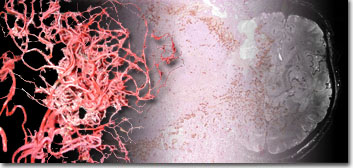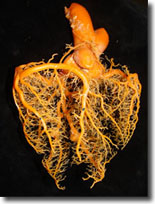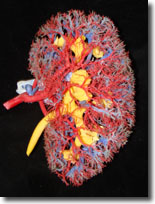
|
|||||||
| Welcome to The Fractal Lab |
|
||||||
|
The Fractal Lab The role of Fractal Geometry in Medicine and Biology Fractals in Biomedicine Short guide to find references in fractal literature Contributions Join the community and contribute to the growth of Fractal Network knowledge News & Events Find information about meetings and scientific symposia on Fractal Geometry Links Main Journals publishing researches about fractals in biomedical sciences... and other useful websites Contact us Keep in touch with the Fractal Lab team! |
 Since the formal coining by the mathematician and physicist Benoît B.
Mandelbrot (1924-2010) in his book "The Fractal Geometry of Nature" published
in 1977, the term Fractal (from the Latin fractus meaning "broken" or
"fractured") has entered in a plethora of fields of research, ranging from
Humanistic Social Sciences to Natural Sciences.
Since the formal coining by the mathematician and physicist Benoît B.
Mandelbrot (1924-2010) in his book "The Fractal Geometry of Nature" published
in 1977, the term Fractal (from the Latin fractus meaning "broken" or
"fractured") has entered in a plethora of fields of research, ranging from
Humanistic Social Sciences to Natural Sciences.The increasing acquiescence that natural forms and processes underline a complexity in shape and in time, not interpretable in terms of traditional Euclidean Geometry and Linear Dynamics has led to a growing development of Fractal-based concepts, mathematical tools and computer-aided methodologies with controversial results and debated usefulness.  The aim of the first Fractal Virtual Laboratory is to generate an
interdisciplinary network of scientists to disseminate the Fractal Geometry in
Medicine and Biology, develop public computer-aided resources and software and
discuss the advancement in the study of the human body as a complex system.
The aim of the first Fractal Virtual Laboratory is to generate an
interdisciplinary network of scientists to disseminate the Fractal Geometry in
Medicine and Biology, develop public computer-aided resources and software and
discuss the advancement in the study of the human body as a complex system.Fractal Lab is an Open Virtual Laboratory where free tools become available to the human community to be friendly applied and tested, discussed and improved with the aim to disseminate a unique Language of Nature and quantitative techniques universally acknowledged.  Researchers from around the World are warmly invited to propose: innovative
ideas, unsolved questions, new fields of debate, advanced experimental
procedures and computer-aided algorithms. It is encouraging that clinicians,
biologists, mathematicians, computer-scientists, psychologists, epistemologists
and philosophers contribute together towards a common understanding of Human
Complexity.
Researchers from around the World are warmly invited to propose: innovative
ideas, unsolved questions, new fields of debate, advanced experimental
procedures and computer-aided algorithms. It is encouraging that clinicians,
biologists, mathematicians, computer-scientists, psychologists, epistemologists
and philosophers contribute together towards a common understanding of Human
Complexity.
This multi-disciplinary approach may help to clarify old concepts, categorize the actual knowledge, and suggest alternative strategies with potential clinical value. Fractal Lab: The Virtual Laboratory of knowledge and know-how without barriers or preclusions, that provides controlled conditions in which peoples operating in a unique Virtual Facility can perform research, experiments, and measurement. |

